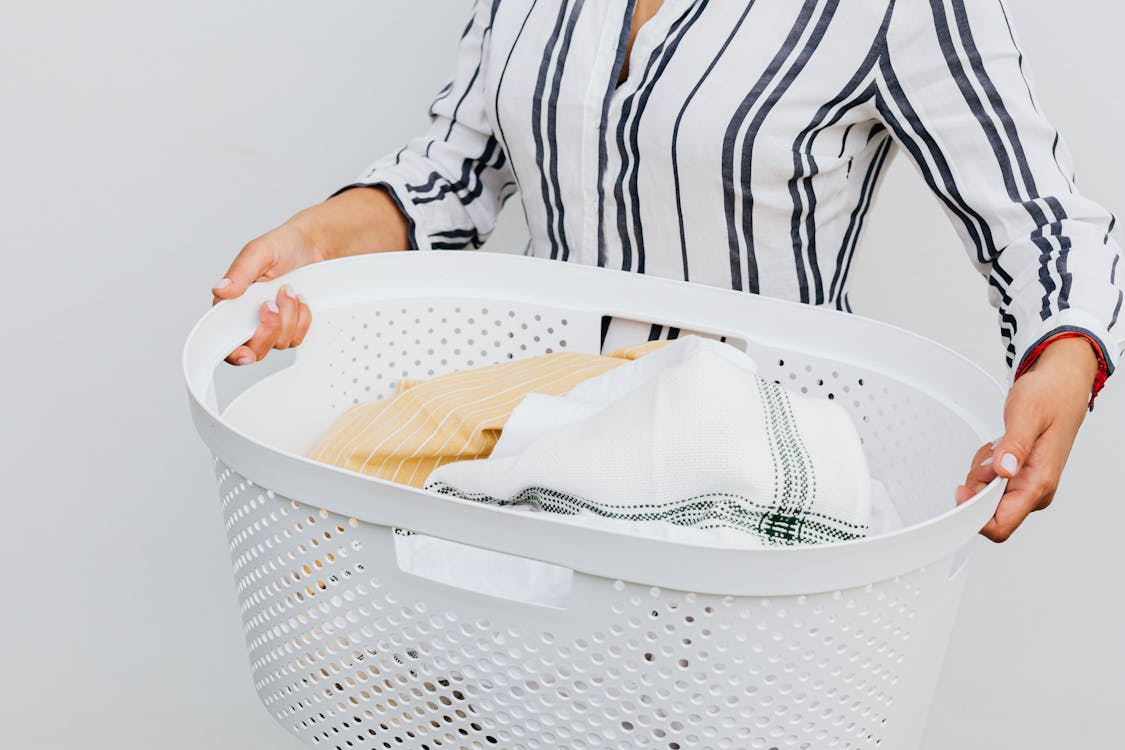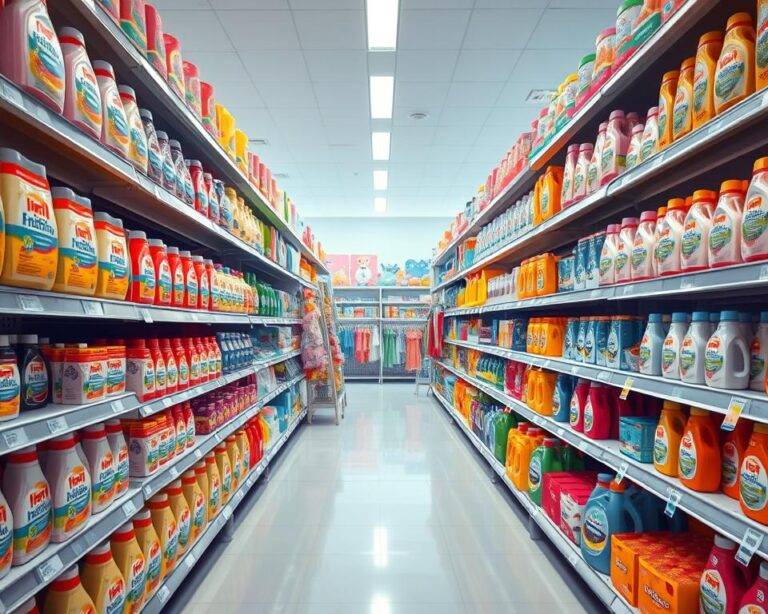In today’s world, where consumers are becoming increasingly conscious of health and environmental issues, the demand for the best all natural laundry detergent is on the rise. These non-toxic laundry detergents, made from plant-based and biodegradable ingredients, provide a safer option for both personal well-being and eco-friendly cleaning. Concerns over chemical additives and their potential effects, such as skin irritations and air quality degradation, are major driving forces behind this shift towards natural alternatives. Notably, 78% of consumers prefer all-natural options to avoid harsh chemicals, and the market for these products has been growing at an impressive rate of 15% annually over the past five years1. The awareness of how conventional laundry detergents can impact indoor air quality, with findings noting more than 25 hazardous air pollutants being emitted from dryer vents, further underscores the importance of making informed choices in laundry care2.

Key Takeaways
- Natural and organic laundry detergents are gaining popularity due to health and environmental concerns.
- 78% of consumers prefer all-natural laundry detergents for better skin sensitivity.
- All-natural detergents have seen a 15% annual increase in sales over the last five years.
- More than 25 hazardous air pollutants can be emitted from conventional laundry products.
- These detergents assure eco-friendly cleaning through plant-based ingredients.
What is All Natural Laundry Detergent?
All natural laundry detergent is a type of cleaning product made from plant-based ingredients and minerals, which avoids the inclusion of synthetic chemicals. These detergents are designed to be biodegradable and often feature non-toxic formulas, making them a popular choice for environmentally conscious consumers. With a growing focus on wellness, many households are now prioritizing natural products, fueling the demand for eco-friendly cleaning solutions.
Several brands are recognized for their effective and safe formulations. For instance, Seventh Generation EasyDose Ultra Concentrate Laundry is a noteworthy option, as it is USDA Certified and boasts a 98% biobased content. These products deliver an effective cleaning experience while minimizing harmful impacts on both human health and the environment.
Using an all natural laundry detergent not only helps to decrease your carbon footprint, but it is also beneficial in enhancing indoor air quality. The absence of harsh chemicals reduces the risk of skin irritation, making these products suitable for sensitive skin. Furthermore, opting for a nontoxic deodorizer like those found in these formulations contributes to overall wellness.
The growing awareness and adoption of natural laundry solutions have led to the emergence of various types, including powders, liquids, and pods. Today, numerous brands are committed to promoting sustainable practices within their production processes while ensuring the safety and efficacy of their products.
Overall, choosing an all natural laundry detergent signifies a commitment to environmental stewardship and personal health. With options available that cater to a range of preferences, finding the ideal detergent to meet individual needs has never been easier. Watch for ingredients and opt for those that feature plant-based components for optimal results34.

Why Choose All Natural Laundry Detergent?
Opting for all-natural laundry detergent provides several health benefits, as many traditional formulas contain harmful substances that aggravate allergies and skin sensitivities. For instance, common components like phosphates and synthetic colorants may lead to allergic reactions and skin irritations, impacting wellness over time5. Choosing eco-friendly options not only supports personal health but also benefits the environment, as conventional detergents can contribute to household wastewater, affecting water systems5.
These eco-friendly products often prove to be efficient, ensuring effective cleaning without the toxicity associated with many chemical-based detergents. This shift contributes to more sustainable fabric care, ultimately preserving the longevity of clothes while reducing the need for frequent replacements. It is noteworthy that using all-natural detergents can significantly lower the residual chemicals left on fabrics post-wash, which is typically about 2.5% with conventional choices5.
Additionally, brands such as Seventh Generation and Tru Earth focus on creating products with biodegradable ingredients and recyclable packaging, highlighting the commitment to both sustainability and longevity. Selecting all-natural options supports a healthier lifestyle and fosters environmental responsibility6.
Key Ingredients to Look For
When selecting an all-natural laundry detergent, understanding the key ingredients is vital for making informed choices. Look for plant-based surfactants, which are derived from sources like coconut oil and palm oil. These natural compounds effectively lift dirt and stains without the harshness of traditional chemicals. Essential oils, such as lavender or tea tree oil, offer not only delightful fragrances but also natural antimicrobial properties, enhancing the cleaning process.
It is important to avoid harmful additives commonly found in some detergents. Ingredients such as artificial fragrances, dyes, bleach, and phosphates can irritate the skin and negatively impact indoor air quality. For instance, many eco-friendly detergents carry the EPA’s ‘Safer Choice’ label, helping consumers identify products that are safer for both health and the environment7.
Being aware of these components allows individuals to choose products that align with a more sustainable lifestyle while also ensuring clean and fresh laundry. Consumers can even opt for DIY solutions, which typically require only a few ingredients, to cut down on costs and unnecessary harmful substances. Homemade detergent costs approximately $0.06 per load and avoids all harmful additives, making it a practical choice for eco-minded families8.
Top Brands for All Natural Laundry Detergents
When exploring top brands for all natural laundry detergents, several popular choices stand out due to their effectiveness and eco-friendly practices. Brands like Earth Breeze, founded in 2019, offer a unique feature by donating ten loads of laundry for every pack of sheets purchased, partnering with over 800 organizations to maximize their impact9. Another noteworthy contender is Dropps, which provides plant-based laundry pods as a sustainable alternative to traditional options. Dropps is also committed to reducing waste by donating excess inventory to outreach organizations9.
Sheets Laundry Club, established in 2019, appeals to the environmentally conscious consumer. This brand, along with others like HeySunday, Molly’s Suds, and Dropps, is noted for being cruelty-free, ensuring that their products are not tested on animals10. For instance, HeySunday laundry sheets offer an affordable solution costing around $0.23 per load with a subscription, delivering convenience through free shipping and returns9.
Each of these brands presents unique features that resonate with consumers seeking sustainable options. The Brooklinen Essential Detergent is eco-friendly, cruelty-free, and dermatologist-tested, while Meliora offers an unscented variant that is safe for HE-compatible machines and ideal for sensitive skin10. The diversity in products from these top brands allows consumers to make informed choices that align with their values.
How to Choose the Best All Natural Laundry Detergent
Choosing laundry detergent requires careful attention to your specific laundry needs assessment. Evaluate factors like fabric type, common stains, and water quality, whether it’s hard or soft. Start your journey by reading labels effectively; this means recognizing which ingredients are plant-based and confirming the absence of harmful chemicals. Most laundry detergents contain toxic chemicals harmful to human health and the environment11.
Be aware that the market offers a variety of eco-friendly options, including natural powders, liquids, pods, and refillable detergents, each tailored to different user preferences11. For instance, brands like Branch Basics provide substantial quantities; for $39, you can get enough detergent for 90 loads12. In your search, consider the price points; affordable choices can range from $0.10 to $0.13 per load, making them budget-friendly11.
Taking time to understand effective label reading will enhance your shopping experience. Look for brands that offer discounts; many provide 10% to 30% off with specific codes, adding extra value to your purchase11. Some brands, such as Truly Free Laundry Wash, are even available exclusively online, broadening your choices further11.
DIY All Natural Laundry Detergent Recipes
Creating your own DIY laundry detergent can be both rewarding and economical. Using simple homemade recipes can save you money while ensuring you are aware of the safe ingredients used. A gallon of natural homemade laundry detergent can cost less than $4, offering an impressive cost of less than 8 cents per load, with each batch providing 50 to 64 loads of laundry13. Basic ingredients often include washing soda, baking soda, liquid castile soap, salt, essential oils, and water14.
For those interested in functional, safe, and sustainable options, making your own detergent allows you to avoid synthetic fragrances and additives found in many commercial products. The typical usage is about 1/3 cup for an average-sized load and 1/4 cup for smaller loads. Many find it helpful to include essential oils for a pleasant scent while maintaining a focus on non-toxic components13.
The popularity of DIY all natural laundry detergent recipes has surged, garnering approximately 9.5K shares across social platforms like Facebook, Twitter, and Pinterest13.
While borax is a common ingredient, some prefer to explore borax-free alternatives, such as Sal Suds or baking soda, due to concerns regarding safety14. Making your own laundry detergent supports not only your wallet but also a more sustainable lifestyle free from harsh chemicals found in conventional products.
Eco-Friendly Packaging in Laundry Detergents
Eco-friendly packaging in laundry detergents is essential for reducing environmental waste. Many brands that care about sustainability are now utilizing recycled materials and compostable options. For instance, Blueland Laundry Tablets come in compostable packaging and contain no harmful chemicals like PVA, making them a great choice for eco-conscious consumers15. On the other hand, Tide Purclean Unscented Liquid, recognized for its eco-friendly attributes, comprises 75% plant-based ingredients while promoting recyclable packaging16.
Brands such as Dropps are leading the way with concentrated detergent pods, available in plastic-free packaging, which aids in minimizing waste16. Additionally, the natural laundry detergents offered by companies like AspenClean are made from sustainably sourced palm oil and designed to be fully recyclable17. Making a switch to these sustainable options can not only help in reducing plastic pollution but also support healthier ecosystems.
How to Store All Natural Laundry Detergent
Proper storing laundry detergent enhances its effectiveness and extends its shelf life. Consider using effective storage solutions such as airtight containers to prevent moisture from compromising the product. Keeping the detergent sealed in a cool, dry area guards against degradation and clumping, which can impact its performance over time. Regularly check expiration dates to ensure quality.
For those making homemade laundry soap, the recommended amount is about 1/4 cup for small loads and 1/2 cup for larger loads, allowing for optimal cleaning without wastage18. If using a 5-gallon bucket full of laundry detergent for a family of four, this can accommodate around six months of usage when doing 1-2 loads daily18. Storing laundry detergent correctly is crucial—extreme temperatures can negatively affect liquid detergents, so choose a stable environment for longevity.
Utilizing proper storage methods not only enhances the utility of your detergent but also aligns with best practices for responsible household management.
How to Use All Natural Laundry Detergent Effectively
Using all-natural laundry detergent requires attention to detail to achieve the best results. Begin by reviewing the dosage recommendations from the specific brand you are using, as they can vary significantly. This ensures you avoid overuse and conserve your detergent effectively. Typically, ultra-concentrated options only require one tablespoon per load, lasting between 32 to 64 loads in a 16oz jar19.
For optimal cleaning, particularly with tough stains, consider employing some stain removal techniques. Early treatment of stains with the detergent can make a considerable difference. Using a pre-soak method might enhance stain removal efficiency, helping your laundry look fresher and cleaner20.
It’s essential to incorporate eco-friendly practices into your washing routine. Washing in cold water not only saves energy but can be as effective as traditional methods. Moreover, conserving energy helps in reducing the environmental impact associated with laundry, which contributes to a significant percentage of household emissions21.
Remember that selecting the right all-natural laundry detergent not only benefits your clothing but also supports a healthier environment.
Common Misconceptions about All Natural Laundry Detergents
Many consumers hold misconceptions about all-natural laundry detergents, often believing they lack the cleaning power of conventional detergents. Myths about laundry detergent suggest these natural options fall short in performance against tough stains and odors. In reality, studies show that some all-natural brands are remarkably effective, often earning high marks for their real performance in cleaning tests.
For instance, Tide’s Ultra HE Vivid Bright + White has received an “excellent” rating for its performance in both warm/hot and cold water, achieving a score of 82/100 from Consumer Reports22. This data reveals that effective cleaning is possible with natural ingredients. Another common belief is that DIY laundry detergents are inadequate. On the contrary, many have documented success utilizing such homemade solutions, often at a fraction of the cost of commercial products22.
Repairman Vernon Schmidt has noted that many households use 10 to 15 times the soap needed for an effective wash, resulting in unnecessary waste22. This highlights the importance of understanding how much detergent is truly necessary, regardless of the brand.
Furthermore, about 60% of exposures to liquid laundry detergent capsules involve children, underscoring the desire for non-toxic alternatives in homes23. This statistic reinforces the idea that all-natural options can provide safer choices without compromising on cleaning efficiency.
Conclusion: Making the Switch
Transitioning to all-natural laundry detergents represents an important step toward promoting healthier living and safeguarding the environment. The all-natural benefits of using these detergents minimize pollution and reduce harmful chemical use, thus contributing to a healthier home and planet24. As many users discover, these eco-friendly alternatives are just as effective in cleaning clothes, often outperforming traditional options in removing stains without the use of toxic substances2526.
For families considering making the switch, it’s essential to explore different brands and assess personal laundry needs. Even if they come with a higher initial cost, concentrated forms of green detergents often prove to be more economical in the long run, offering notable savings and longevity2425. By reducing the chemical exposure in their homes through informed choices, consumers can not only improve the quality of their laundry routine but also lessen the environmental impact of their washing habits.
In conclusion, making the switch to all-natural laundry detergents can lead to cleaner clothes and a cleaner planet. With the collective effort of conscientious consumers, we can foster better sustainable practices that benefit both individual households and the broader environment2526.
FAQ
What is all natural laundry detergent?
All natural laundry detergent is a cleaning product formulated from natural ingredients, typically derived from plants or minerals, avoiding toxic chemicals. These detergents are biodegradable and non-toxic, making them safer for personal health and the environment.
Why should I choose all natural laundry detergent over conventional options?
Choosing all natural laundry detergent offers health benefits by excluding harmful substances like sulfates and VOCs, which can irritate skin and aggravate allergies. They are also environmentally friendly, are gentler on water systems, and can help improve indoor air quality.
What key ingredients should I look for in all natural laundry detergents?
Look for plant-based surfactants, such as coconut-derived compounds, and essential oils like lavender or tea tree for natural fragrance and antimicrobial properties. Avoid harmful additives such as artificial fragrances, dyes, and optical brighteners.
Can you recommend any top brands for all natural laundry detergents?
Popular brands include Charlie’s Soap, Branch Basics, and Meliora. Each of these brands is known for their effective cleaning abilities, eco-friendly packaging, and commitment to sustainability.
How can I choose the best all natural laundry detergent for my needs?
Assess your specific laundry needs, such as fabric types and typical stains, and read labels carefully. Look for clear descriptions of plant-based components and ensure the absence of harmful additives.
Is it easy to make my own all natural laundry detergent?
Yes! You can create DIY all natural laundry detergent using common ingredients like washing soda, borax, and essential oils. Just make sure to avoid toxic substances like synthetic fragrances and dyes.
What should I consider regarding eco-friendly packaging?
Eco-friendly packaging minimizes waste and supports sustainability. Brands like Blueland and Dropps utilize recycled or compostable materials in their packaging to reduce environmental impact.
How should I store my all natural laundry detergent?
To maintain the quality and effectiveness of all natural laundry detergent, store it sealed in a cool, dry area. Using airtight containers can help prolong shelf life and prevent clumping or degradation.
What tips can help me use all natural laundry detergent effectively?
Follow the dosage recommendations on the label to avoid wastage. For stain removal, treat stains early with the detergent or consider a pre-soak method for better results.
Are there any common misconceptions about all natural laundry detergents?
Yes, many people believe that all natural laundry detergents are less effective than conventional options. However, studies show that many natural brands perform excellently in cleaning stains and odors when used correctly.



